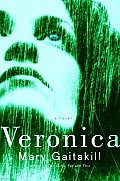
Much has been said of the creepy undercurrent of Mary Gaitskill's fiction, her characters' over-the-ledge desires and preoccupations, their cruelty and/or masochism, her seamless flow from ethereal beauty to sticky bodily functions and back. So I won't dwell on those things, because the main thing I take away from her newest novel, VERONICA, is her virtuoso use of a classic modernist narrative structure: namely, the ramble. In the tradition of Leopold Bloom and Clarissa Dalloway, Gaitskill's protagonist Alison takes a long walk and thinks a lot. The skeleton of VERONICA, like the Joyce and Woolf novels, is a day-in-the-life. Alison, an aging, ill former model, walks to work, works, then visits some friends, then takes a bus to a trail head and walks through a canyon, up a mountain, and back down.
The simplicity of this structure allows Gaitskill to riff in poetic and complex ways, embedding the "now" of the story with numerous other nested "nows," as Alison reflects with some wisdom on her life, the ugliness of her career, the nature of beauty, pity, and illness, and the loss of her eccentric, unbeautiful friend Veronica to AIDS.
A word about pity. In Gaitskill's universe, it's not an insult. It's a form of love. And illness is a normal state of being, illness being anything that doesn't conform to external ideals of beauty and health, which is virtually everything. Pity has a universality in her world, and under the skin of each living thing is disease, which sometimes surges to the surface. Disease has the power to take loved ones away from us, but its permanence has the effect of unification too: Alison observes, for example, that through death, Veronica's deep love for her deceased bisexual boyfriend is finally "requited."
And Alison is dying too, more slowly, of hepatitis. Her arm has been ruined by botched surgery, and she pops aspirin often to control the pain. Still, she takes a hike in a Marin County canyon because she wants to while she still can, and the day's journey offers rich moments of rumination on people and their natures. People are nature, nature is people. From the bus, near the trailhead, Alison observes:
I look outside and see a little budding tree, its slim black body shining with rain. Joyous and intelligent, like a fresh girl, the earth all new to its slender, seeking roots.
But later, on the hike, even trees lose their innocence, harden, and get more interesting:
Here is another slim ocher tree naked of bark. It is utterly smooth and, in the rain, so shiny that it looks almost plastic. It is twisted so elegantly, it is like an art object, made to suggest irony and hauteur...I take off my glove and stroke the tree trunk as I walk past. I wonder if it is diseased.
I found the moments of redemption and reflection in VERONICA very satisfying, and ended up copying numerous exemplary passages in my notebook to ruminate on myself, on my own rambling walks. Believe the hype, Gaitskill has outdone herself.
2 comments:
I completely agree, Anne. I loved this book.
no clue. maybe find out who her agent is and contact them?
Post a Comment